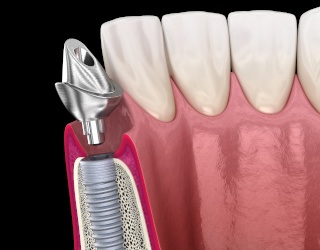Dental Implants
Modern Solutions for Missing Teeth
It goes without saying that even a single lost tooth can have significant repercussions for your health as well as your life. While keeping all of your natural teeth is always the preferable option, the next best thing is to replace them with dental implants. When covered with an appropriate restoration, dental implants improve your oral health and seamlessly restore the beauty of your smile. Call Holliston Complete Dentistry today to set up your first consultation to discuss tooth replacement with dental implants and learn how Dr. Abernethy can help with the process.
Why Choose Holliston Complete Dentistry for Dental Implants?
-
Partnered with
Implant Experts - Dental Office That Treats Patients as People
-
Experienced,
Caring Dentist
What are
Dental Implants?

A dental implant is a thin metal post shaped like a screw, normally made out of titanium. You might think it’s odd that it doesn’t look like a tooth at all, but that is because the implant post itself is designed to be placed in the jawbone and act as new tooth roots. The restoration attached to the implant is what everybody else will see when you smile. When implants are combined with the right kind of restoration, the result is a new smile that looks, feels, and functions like the natural thing.
The 4-Step Dental Implant Process

Due to the treatment process involved, getting dental implants takes a few months or so. That said, rest assured – these replacement teeth are worth the time and effort! Our practice works with local specialists to ensure your implants are well-placed and have great long-term benefits. While that means each patient’s treatment looks a bit different, the process still has several consistent steps. Your implant journey will include a consultation, implant surgery, osseointegration, and delivery of the final restoration.
Initial Dental Implant Consultation

At the start of the implant process, you’ll meet with Dr. Abernathy for a short consultation. This session lets her learn about your treatment goals, oral health, medical history, and so on. She’ll then review these details to see if dental implants suit you, using them to decide your custom treatment plan.
If you don’t initially qualify for dental implants, please don’t worry. It’s possible to become a good candidate later through preliminary services – gum disease therapy, tooth extractions, etc. By getting these treatments, your mouth will have the strength to handle implant posts.
Dental Implant Surgery

We’ll refer you to local specialists once you’re ready for dental implant surgery. Since these figures have advanced training and experience, they’ll effectively place your final implants. You can look forward to excellent results!
Your implant surgery will feature the following:
- Anesthesia – Before placing dental implants, the specialists will numb your treatment site(s) with anesthesia. This step keeps you from feeling pain during surgery; you’ll only sense a slight pressure instead.
- A Minor Incision – The specialists will make a small gum incision after the anesthesia is applied. By doing so, they’ll create space in your mouth for the future dental implant.
- Implant Placement – Using advanced methods and tools, the specialists will place your implant in the incision site.
- Gum Closure – The specialists will close your gum incision when the placement is finished. They’ll then place a cap over your new implant to wrap things up.
Dental Implant Osseointegration & Abutment

Your dental implants will slowly fuse with your jaw after the surgery. This process (i.e., osseointegration) takes 4-6 months, leaving your implant posts strong and secure. As a result, your new teeth will become permanent parts of your mouth.
Our team will perform a follow-up surgery once you’ve recovered from the fusion process. That procedure will place an abutment – a metal connector – on your implant. Said abutment will secure your final restoration, keeping it in place.
Delivery of Dental Implant Restoration(s)

The last phase of the dental implant process is the delivery of your final restoration. For this step, we’ll place a prosthetic that “matches up” with how many teeth you lost. The device can range from a single dental crown or dental bridge to an implant denture.
Fitting your final restoration won’t take long; we only need to apply some dental cement. Once it’s secured, we’ll make last-minute adjustments that ensure optimal results. You’ll then be ready to enjoy your new and restored smile!
Benefits of Dental Implants

If you ask any dentist about the best way to replace missing teeth, nearly all of them will say dental implants. Why? Instead of just sitting on the gums, this solution takes it one step further by recreating the entire structure of the teeth. Essentially, it will look and feel as if your natural teeth had never been lost in the first place! Compared to traditional dental bridges and dentures, there are numerous benefits that you can enjoy with dental implants. Keep reading to learn a few of them!
Day-to-Day Benefits

- Smile confidently – The jawbone naturally changes shape after tooth loss, causing dentures to lose their fit over time and start slipping around. Dental implants preserve the jawbone’s shape and keep your new teeth anchored in place, so you can smile without worrying about them shifting or falling out.
- Speak clearly – Poorly fitting dentures are notorious for making clicking or whistling sounds or causing people to slur their words. Again, dental implants stay firmly in place, so this shouldn’t be an issue.
- Eat your favorite foods – One of the main benefits of dental implants is that they restore almost all of the biting and chewing power you had with your original teeth. You’ll have no problem digging in to your favorite crunchy and chewy foods!
- Clean your teeth easily – While dentures require a complex and time-consuming daily cleaning routine, dental implants can be brushed and flossed just like natural teeth.
Health Benefits

- Jawbone health – Every time you bite or chew, that force travels through the roots of your teeth and strengthens your jawbone. When teeth are lost, though, the jawbone loses that stimulation and begins to deteriorate, which may increase the risk of further tooth loss as your remaining teeth lose support. Luckily, dental implants stimulate the jawbone exactly like natural teeth, keeping it healthy and strong.
- Oral health – Dental implants can support themselves without relying on any of your remaining teeth for support. This makes them a more conservative option than a dental bridge, which requires your dentist to remove some enamel from two of your natural teeth. As a result, the teeth you have left will stay stronger for much longer.
- Overall health – Since dental implants let you eat practically anything, you’ll be able to fill your diet with fresh fruits, vegetables, tough meats, and other nutritious foods that denture wearers often have trouble eating. Therefore, it will be easier to maintain a generally healthy body.
Long-Term Benefits

- Look younger – By preventing jawbone loss, dental implants also prevent the collapse of your facial structures that can result in a wrinkled, older appearance. They can help you retain a youthful glow for years to come!
- Enjoy your new teeth for decades – While dentures and bridges typically break down and need to be replaced after five to 10 years, dental implants can last for 30 years or longer if you take good care of them.
- Save money – Although implants may seem more expensive at first, they may actually be more cost-effective in the long run. Not only will you not have to pay for frequent repairs or replacements like you would with traditional prosthetics, but you also won’t need specialized cleaning products or adhesives.
Who Dental
Implants Can Help

You may be able to get dental implants if you’ve lost at least one tooth and meet the following criteria:
- You have enough jawbone density to support an implant post.
- You are not currently suffering from gum disease.
- You do not have a health condition that could potentially complicate the surgery.
- If you do not fulfil the above criteria, you are able to undergo any preliminary procedures deemed necessary for fixing the problem.
If you meet the above criteria, you can undergo one of the following implant procedures:
Missing Single Tooth

A dental implant will be carefully placed in the lone gap in the arch in question, then topped with a crown once osseointegration is complete. In many cases, this procedure can be seen as an alternative to a traditional bridge, which means that you will preserve more of your natural smile.
Missing Multiple Teeth

When at least three teeth in a row have been lost, an implant bridge can fill all of the empty space. A pair of implants are placed to support the bridge. The number of prosthetic teeth between the crowns of the bridge will vary depending on how large the gap is.
Missing All of Your Teeth

An entire arch of teeth can be replaced with an implant denture attached to a number of dental implant posts. The restoration will click securely into place over the dental implants, so they will not slip or move at any point.
Understanding the Cost of Dental Implants

The cost of dental implants varies widely from patient to patient, with your final expense depending on your unique needs. That means you’ll need to consult our dentists for a more precise estimate. Once you have, our team will work with you to make treatment more affordable. We can walk you through dental implants’ cost factors, payment options, and more. Please keep reading or call our office soon for further details.
Preliminary Treatments & Dental Implant Surgery

You may require extra care before your dental implant surgery. For instance, perhaps your mouth needs a bone graft, periodontal therapy, or tooth extraction first. These services would add to your treatment costs, though they’d ensure your new smile’s success. Still, most dental plans do partially cover them.
You also shouldn’t forget about implant surgery’s price. This expense can rise or fall based on anesthesia, final implant location, etc. We work with local specialists for the placement process, so they’ll discuss the surgery’s cost with you separately.
The Parts of Your Dental Implant

Your implants’ components also affect their price. These include:
- Implant Number – One dental implant for a lost tooth costs less than four to six for an implant denture. Meanwhile, an implant denture is more cost-effective than replacing each tooth separately.
- Implant Material – Dental implants can be made from different materials. For example, zirconia implants cost more than titanium ones.
- Implant Brand – Your dental implants may cost more or less based on their brand. Since implant providers cater to varying needs, they charge varying amounts.
- Restoration Type – Dental crowns, bridges, and dentures have distinct prices. The smaller your final restoration, the less it should cost.
How Dental Implants Can Save You Money

Dentures and dental bridges seem pretty cost-effective at first. Compared to dental implants, both have a lower upfront price. Even so, looks are deceiving. The truth is that dental implants save you more in the long run.
Remember, dental implants can potentially last a lifetime. Their long lifespans (15-30 years or more) mean they rarely need repairs. Plus, the posts don’t require any “accessories” – adhesives, pastes, etc. They also improve their patients’ oral health. When taken together, these facts ensure implants pay off over time and don’t lead to costly follow-ups.
Does My Dental Insurance Cover Dental Implants?

Dental insurance doesn’t typically cover dental implants. For that reason, patients usually pay out of pocket for them.
Of course, there are exceptions to this rule. Your dental plan may well offer partial coverage. That’s why you should review your policy’s benefits before treatment. If you’d like, our office’s team members will help you with that.
Making Dental Implants Affordable

Dental implants can still be affordable without insurance. To make them more budget-friendly, you could rely on our office’s other payment options. These are the following:
- In-House Membership Plan – You can join our office’s in-house membership plan for one flat rate. It would give you a 10% discount on dental implants.
- Lending Club Financing – Our practice works with Lending Club, a reputable third-party financier. They’d let you cover dental implant treatment with six or 12-month payment plans.
Holliston Complete Dentistry wants to give you effective and affordable dental implants. So, learn more about financing them by visiting our office!
Dental Implant FAQs

By now, you may be considering dental implants. You could certainly trust them – they’re amazing at restoring and enhancing smiles! That said, it’s natural if you still have some leftover concerns. Like any patient, you’d prefer to feel confident about an upcoming treatment. Luckily enough, Holliston Complete Dentistry has you covered: below are the answers to some oft-asked dental implant questions. Reading them will let you see how our tooth replacements work. Otherwise, feel free to call our office for additional details.
Am I Too Young to Get Dental Implants?
In truth, a person’s jaw only fully develops in young adulthood. Some people’s jaws don’t even finish growing until their mid-20s. As such, dentists won’t place implants in patients under 18. Doing so would interfere with an individual’s bone development and cause complications.
Given these facts, you can receive dental implants if you’re a healthy adult. If you’re still a teen, alternative restorations like dentures or dental bridges are more advisable.
How Successful Are Dental Implants?
Rest assured, dental implants are highly successful as tooth replacements. They have a success rate of over 95% when placed by qualified professionals! Therefore, you can trust they’ll work after the initial surgery.
Still, implants do depend on proper care to function in the long run. They’re likely to fail early without such maintenance. Following implant surgery, then, remember to do the following:
- Practice Good Oral Hygiene – As you always should, brush your teeth twice daily and floss between them once daily.
- See Your Dentist Often – If you attend regular checkups and cleanings, you’re less likely to have problems that could threaten implants.
- Eat a Mouth-Healthy Diet – A high sugar intake could cause cavities and gum disease – issues known to trigger implant failure.
How Long Does It Take to Recover from Dental Implant Surgery?
Generally, recovery from implant surgery occurs in two stages: the short-term and the long-term. Each one follows a unique timeline.
In the short-term, recovery from implant surgery takes little time. You should be fine to resume normal activities the day after. That said, avoid strenuous exercise during the first week after treatment. You might delay the healing process otherwise.
Long-term recovery, meanwhile, can take several months. After all, implants need much time to fuse with your jawbone. You should be very careful of your mouth during this period.
Do Dental Implants Make You Look Younger?
Ultimately, yes –dental implants do make you look younger. The final restorations help your face look fuller and less saggy.
You see, implants both reverse and prevent facial collapse. They act as substitute teeth and stimulate your jawbone. As such, the prosthetics ensure your jaw keeps supporting your facial structures. You thus won’t have to endure a wrinkly, sunken face or fine lines around your mouth.
